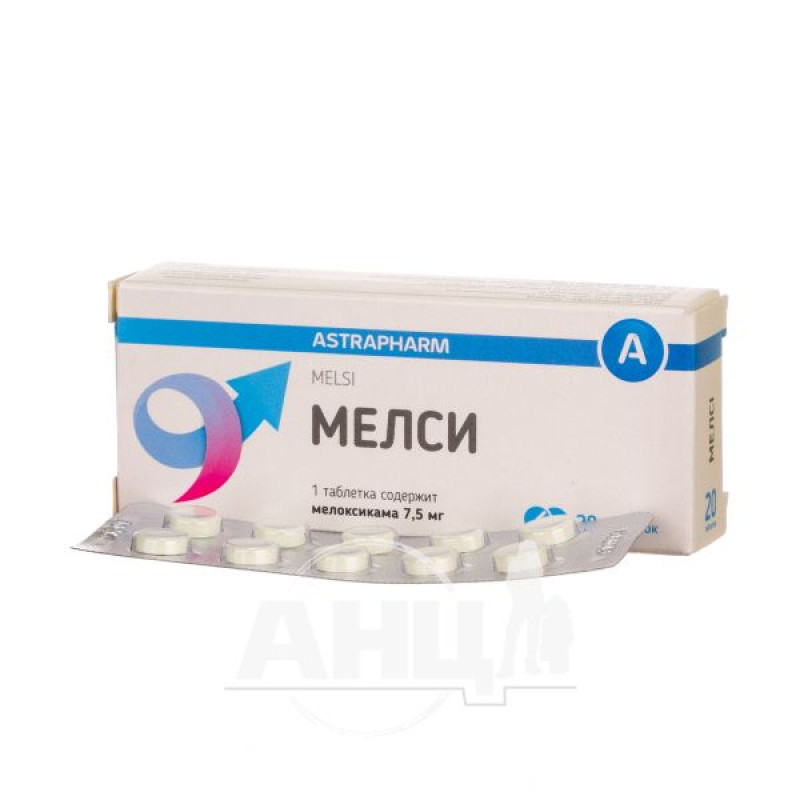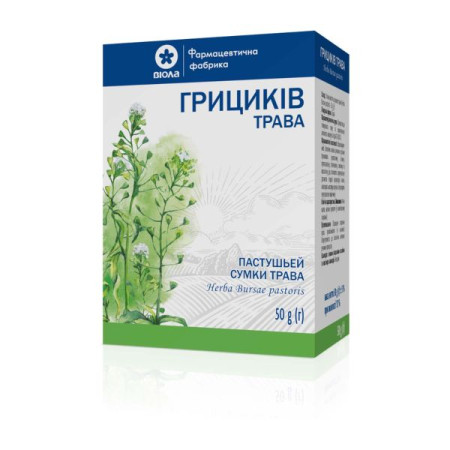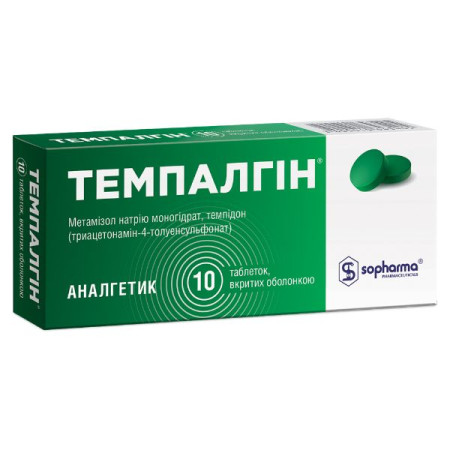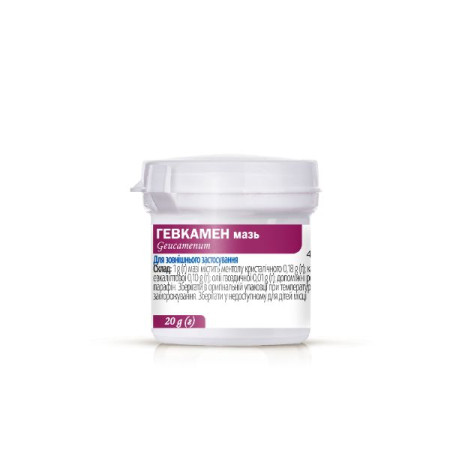Melsi tablets 7.5 mg blister No. 20
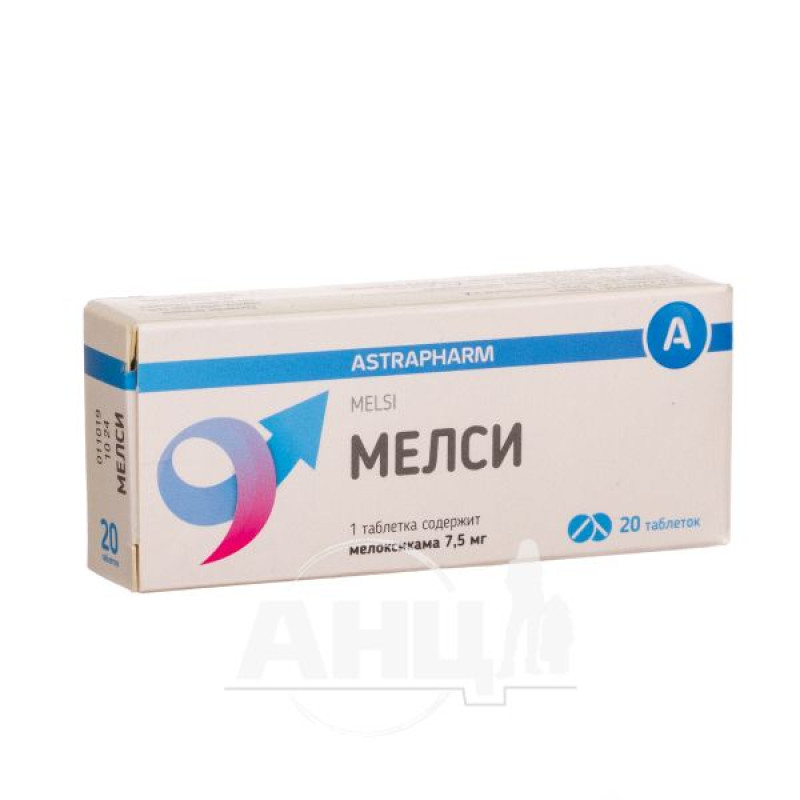
Mels tablets are indicated for short-term symptomatic treatment of exacerbations of osteoarthritis. Long-term symptomatic treatment of rheumatoid arthritis and ankylosing spondylitis.
Composition
Active ingredient: meloxicam;
1 tablet contains meloxicam 7.5 mg or 15 mg;
Excipients: sodium; lactose monohydrate, microcrystalline cellulose, povidone, colloidal silicon dioxide, crospovidone; magnesium stearate.
Contraindication
hypersensitivity to meloxicam or other components of the drug, or to active substances with a similar effect, such as non-steroidal anti-inflammatory drugs, aspirin. Meloxicam should not be prescribed to patients who have experienced symptoms of asthma, nasal polyps, angioedema or urticaria after taking aspirin or other non-steroidal anti-inflammatory drugs; peptic ulcer in the acute stage or in history; gastrointestinal bleeding or perforation, including those associated with previous NSAID therapy in history, cerebrovascular bleeding or other hemorrhagic disorders; severe hepatic insufficiency; severe renal insufficiency not amenable to dialysis; children under 16 years of age; III trimester of pregnancy; severe heart failure.Method of application
It is administered orally.
The total daily amount of the drug should be taken once, washed down with water or other liquid, during meals.
Adverse reactions can be minimized by using the lowest effective dose for the shortest duration necessary to control symptoms. The patient's need for symptomatic relief and response to treatment should be assessed periodically.
Application features
Pregnant women
During the first and second trimesters of pregnancy, meloxicam should not be used unless clearly necessary. If a woman is trying to become pregnant or uses meloxicam during the first and second trimesters of pregnancy, the dosage and duration of treatment should be kept to the lowest possible dose.
Meloxicam is contraindicated in the third trimester of pregnancy.
Children
Not recommended for use in children under 16 years of age.
Drivers
Patients with visual impairment, drowsiness or other central nervous system disorders are advised to refrain from driving or operating machinery.
Overdose
Symptoms of acute NSAID overdose are usually limited to lethargy, drowsiness, nausea, vomiting, and epigastric pain, which are generally reversible with supportive therapy. Gastrointestinal bleeding may occur. Severe poisoning may result in increased blood pressure, acute renal failure, hepatic dysfunction, respiratory depression, coma, convulsions, cardiovascular failure, and cardiac arrest. Anaphylactic reactions have been reported with therapeutic use of NSAIDs and may also occur with overdose.
In case of NSAID overdose, symptomatic and supportive measures are recommended. Studies have shown that the elimination of meloxicam is accelerated by the administration of 4 oral doses of cholestyramine 3 times a day.
Side effects
Nausea, vomiting, diarrhea, flatulence, constipation, dyspepsia, abdominal pain, melena, haematemesis, ulcerative stomatitis, exacerbation of colitis and Crohn's disease.
Interaction
Combination with other NSAIDs, including acetylsalicylic acid at a dose of ≥ 500 mg per dose or ≥ 3 g daily dose, is not recommended.
Concomitant use with corticosteroids requires caution due to the increased risk of bleeding or ulceration in the gastrointestinal tract.
The risk of bleeding is significantly increased due to inhibition of platelet function and damage to the gastroduodenal mucosa. NSAIDs may enhance the effects of anticoagulants such as warfarin. The concomitant use of NSAIDs and anticoagulants or heparin is not recommended in geriatric practice or at therapeutic doses.
In other cases, heparin should be used with caution due to the increased risk of bleeding. Careful monitoring of the INR (international normalized ratio) is necessary if it is proven impossible to avoid this combination.
Deferasirox: Concomitant use of meloxicam and deferasirox may increase the risk of gastrointestinal adverse reactions. Caution should be exercised when combining these drugs.
Cholestyramine: Cholestyramine accelerates the elimination of meloxicam due to impaired intrahepatic circulation, so the clearance of meloxicam increases by 50% and the half-life decreases to 13 ± 3 hours. This interaction is clinically significant.
Storage conditions
Store in the original packaging at a temperature not exceeding 25 °C.
Keep out of reach of children.
Shelf life - 5 years.
There are no reviews for this product.
There are no reviews for this product, be the first to leave your review.
No questions about this product, be the first and ask your question.






